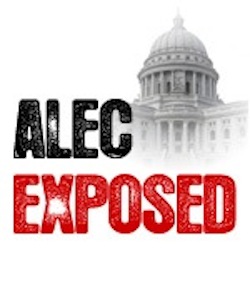Submitted by Brendan Fischer on
 In the midst of corporations voting with state politicians on corporate wishlists to rewrite the law, some messages at the American Legislative Exchange Council (ALEC) Annual Meeting in New Orleans got a little mixed up. Here are two examples.
In the midst of corporations voting with state politicians on corporate wishlists to rewrite the law, some messages at the American Legislative Exchange Council (ALEC) Annual Meeting in New Orleans got a little mixed up. Here are two examples.
America is Driving Biotech Away ... and Attracting It
Different pharmaceutical industry interests presented contradictory views about America's regulatory climate in efforts to influence and gain the esteem of ALEC legislators.
The pharmaceutical trade association PhRMA sponsored Wednesday's lunch (where Louisiana Governor Bobby Jindal extolled the political power of obstinance). PhRMA's Executive Vice President, Chip Davis, touted the pharmaceutical industry's "vital" role in creating jobs and keeping people healthy. Davis said the industry will locate "where economic growth and rewarding innovation matters," but warned ALEC members that competition for biotech investment is no longer between states, but with other countries. He asked,"will the U.S. enact policies that drive biotech elsewhere?"
In contrast, the following morning a representative from the Japanese pharmaceutical company Takeda praised America's "manageable tax and regulatory environment that attracts [foreign] companies to locate in this country." Takeda sponsored ALEC's Thursday breakfast and was one of the highest-spending corporate sponsors at the 2011 ALEC conference. Takeda's head of government and external affairs, David Dieter, wrapped the Japanese company in the American flag, citing its founder's apparently unconscious belief in "Jeffersonian principles," even though the company started in Japan 200 years ago -- well before Commodore Perry opened Japan to western investment -- and started its American branch only 13 years ago. Rather than threaten legislators that failing to support the biotech industry will drive Takeda back to Japan, Dieter encouraged legislators to "reinforce the Jeffersonian principles that make us the greatest country in the world."
Unelected, Unaccountable Bodies Making Law is Bad ... Unless We are Doing It
While diverse corporate interests at times collided at the ALEC conference, some statements made in the ALEC workshops were also incongruous.
Panelists at the "Rationing by Any Other Name" workshop took issue with the Independent Payment Advisory Board (IPAB), an agency created by the 2010 federal healthcare reforms with authority to make changes to Medicare payments. Between accusations that the IPAB constituted government "rationing," Diane Cohen of the Koch-funded Goldwater Institute discussed her organization's lawsuit against the IPAB. Cohen claimed the IPAB was unconstitutional because it was an unelected, unrepresentative body with the authority to make laws. Few seemed to notice the irony that ALEC might also fit that description.
The workshop took place in the midst of ALEC task force meetings where unelected, unaccountable corporations work behind closed doors with state legislators to vote on "model" bills to advance the corporate agenda, bills which legislators often pass without alteration. ALEC boasts that corporations have both a "voice and a vote" in drafting and approving this model legislation. ALEC "model bills" are almost always introduced in the legislator's own name--cleansed of any reference to the corporations that secretly voted for the legislation or drafted it--prohibiting the public from knowing the true origin of the law and holding the appropriate parties accountable.
In criticizing the IPAB, Cohen quoted from parts of Justice Antonin Scalia's dissenting opinion in the U.S. Supreme Court decision Mistretta v. United States, which analyzed a delegation of lawmaking authority by Congress to an unelected board. Scalia's dissent asserted that "the basic policy decisions governing society are to be made by the Legislature" and warned of the threat to our constitutional system if laws are made by "a new Branch altogether, a sort of junior-varsity Congress."
Might that logic apply to ALEC?

Comments
Anonymous replied on Permalink
unelected and unrepresentative bodies
1st cav replied on Permalink
elected but unrepresentative
Anonymous replied on Permalink
Are you serious?